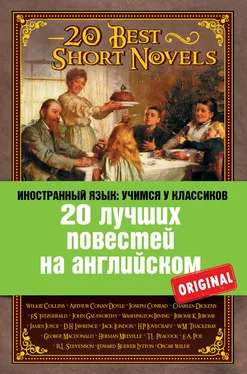‘What, Wilfrid of Templestowe, Wilfrid the married man, Wilfrid the henpecked!’ cried the King with a sudden burst of good-humor, flinging away the culverin from him, as though it had been a reed (it lighted three hundred yards off, on the foot of Hugo de Bunyon, who was smoking a cigar at the door of his tent, and caused that redoubled warrior to limp for some days after). ‘What, Wilfrid my gossip? Art come to see the lion’s den? There are bones in it, man, bones and carsses, and the lion is angry,’ said the King, with a terrific glare of his eyes. ‘But tush! we will talk of that anon. Ho! bring two gallons of hypocras for the King and the good Knight, Wilfrid of Ivanhoe. Thou art come in time, Wilfrid, for, by St. Richard [771]and St. George [772], we will give a grand assault to-morrow. There will be bones broken, ha!’
‘I care not, my liege,’ said Ivanhoe, pledging the sovereign respectfully, and tossing off the whole contents of the bowl of hypocras to his Highness’s good health. And he at once appeared to be taken into high favor; not a little to the envy of many of the persons surrounding the King.
As his Majesty said, there was fighting and feasting in plenty before Chalus. Day after day, the besiegers made assaults upon the castle, but it was held so strongly by the Count of Chalus and his gallant garrison, that each afternoon beheld the attacking-parties returning disconsolately to their tents, leaving behind them many of their own slain, and bringing back with them store of broken heads and maimed limbs, received in the unsuccessful onset. The valor displayed by Ivanhoe in all these contests was prodigious; and the way in which he escaped death from the discharges of mangonels, catapults, battering – rams, twenty-four pounders, boiling oil, and other artillery, with which the besieged received their enemies, was remarkable. After a day’s fighting, Gurth and Wamba used to pick the arrows out of their intrepid master’s coat-of-mail, as if they had been so many almonds in a pudding. ’Twas well for the good knight, that under his first coat-of-armor he wore a choice suit of Toledan steel [773], perfectly impervious to arrow-shots, and given to him by a certain Jew, named Isaac of York, to whom he had done some considerable services a few years back.
If King Richard had not been in such a rage at the repeated failures of his attacks upon the castle, that all sense of justice was blinded in the lionhearted monarch, he would have been the first to acknowledge the valor of Sir Wilfrid of Ivanhoe, and would have given him a Peerage and the Grand Cross of the Bath at least a dozen times in the course of the siege: for Ivanhoe led more than a dozen storming parties, and with his own hand killed as many men (viz. two thousand three hundred and fifty-one) within six, as were slain by the Lion-hearted monarch himself. But his Majesty was rather disgusted than pleased by his faithful servant’s prowess; and all the courtiers, who hated Ivanhoe for his superior valor and dexterity (for he would kill you off a couple of hundreds of them of Chalus, whilst the strongest champions of the King’s host could not finish more than their two dozen of a day), poisoned the royal mind against Sir Wilfrid, and made the King look upon his feats of arms with an evil eye. Roger de Backbite sneeringly told the King that Sir Wilfrid had offered to bet an equal bet that he would kill more men than Richard himself in the next assault: Peter de Toadhole said that Ivanhoe stated everywhere that his Majesty was not the man he used to be; that pleasures and drink had enervated him; that he could neither ride, nor strike a blow with sword or axe, as he had been enabled to do in the old times in Palestine: and finally in the twenty-fifth assault, in which they had very nearly carried the place, and in which onset Ivanhoe slew seven, and his Majesty six, of the sons of the Count de Chalus, its defender, Ivanhoe almost did for himself, by planting his banner before the King’s upon the wall; and only rescued himself from utter disgrace by saving his Majesty’s life several times in the course of this most desperate onslaught.
Then the luckless knight’s very virtues (as, no doubt, my respected readers know,) made him enemies amongst the men nor was Ivanhoe liked by the women frequenting the camp of the gay King Richard. His young Queen, and a brilliant court of ladies, attended the pleasure-loving monarch. His Majesty would transact business in the morning, then fight severely from after breakfast till about three o’clock in the afternoon from which time, until after midnight, there was nothing but jigging and singing, feasting and revelry, in the royal tents. Ivanhoe, who was asked as a matter of ceremony, and forced to attend these entertainments, not caring about the blandishments of any of the ladies present, looked on at their ogling and dancing with a countenance as glum as an undertaker’s, and was a perfect wet-blanket in the midst of the festivities. His favorite resort and conversation were with a remarkably austere hermit, who lived in the neighborhood of Chalus, and with whom Ivanhoe loved to talk about Palestine, and the Jews, and other grave matters of import, better than to mingle in the gayest amusements of the court of King Richard. Many a night, when the Queen and the ladies were dancing quadrilles and polkas (in which his Majesty, who was enormously stout as well as tall, insisted upon figuring, and in which he was about as graceful as an elephant dancing a hornpipe). Ivanhoe would steal away from the ball, and come and have a night’s chat under the moon with his reverend friend. It pained him to see a man of the King’s age and size dancing about with the young folks. They laughed at his Majesty whilst they flattered him: the pages and maids of honor mimicked the royal mountebank almost to his face; and, if Ivanhoe ever could have laughed, he certainly would one night when the King, in light-blue satin inexpressibles, with his hair in powder, chose to dance the minuet de la cour with the little Queen Berangeria.
Then, after dancing, his Majesty must needs order a guitar, and begin to sing. He was said to compose his own songs words and music – but those who have read Lord Campobello’s ‘Lives of the Lord Chancellors’ are aware that there was a person by the name of Blondel, who, in fact, did all the musical part of the King’s performances; and as for the words, when a king writes verses, we may be sure there will be plenty of people to admire his poetry. His Majesty would sing you a ballad, of which he had stolen every idea, to an air that was ringing on all the barrel-organs of Christendom, and, turning round to his courtiers, would say, ‘How do you like that? I dashed it off this morning.’ Or, ‘Blondel, what do you think of this movement in B flat?’ or what not; and the courtiers and Blondel, you may be sure, would applaud with all their might, like hypocrites as they were.
One evening – it was the evening of the 27th March, 1199, indeed – his Majesty, who was in the musical mood, treated the court with a quantity of his so-called composition, until the people were fairly tired of clapping with their hands and laughing in their sleeves. First he sang an original air and poem, beginning
Cherries nice, cherries nice, nice, come choose,
Fresh and fair ones, who’ll refuse?’ &c.
The which he was ready to take his affidavit he had composed the day before yesterday. Then he sang an equally original heroic melody, of which the chorus was
Rule Britannia, Britannia rules the sea,
For Britons never, never, never slaves shall be,’ &c.
The courtiers applauded this song as they did the other, all except Ivanhoe, who sat without clanging a muscle of his features, until the King questioned him, when the knight, with a bow said ‘he thought he had heard something very like the air and the words elsewhere.’ His Majesty scowled at him a savage glance from under his red bush eyebrows; but Ivanhoe had saved the royal life that day, and the King, therefore, with difficulty controlled his indignation.
Читать дальше
Конец ознакомительного отрывка
Купить книгу












